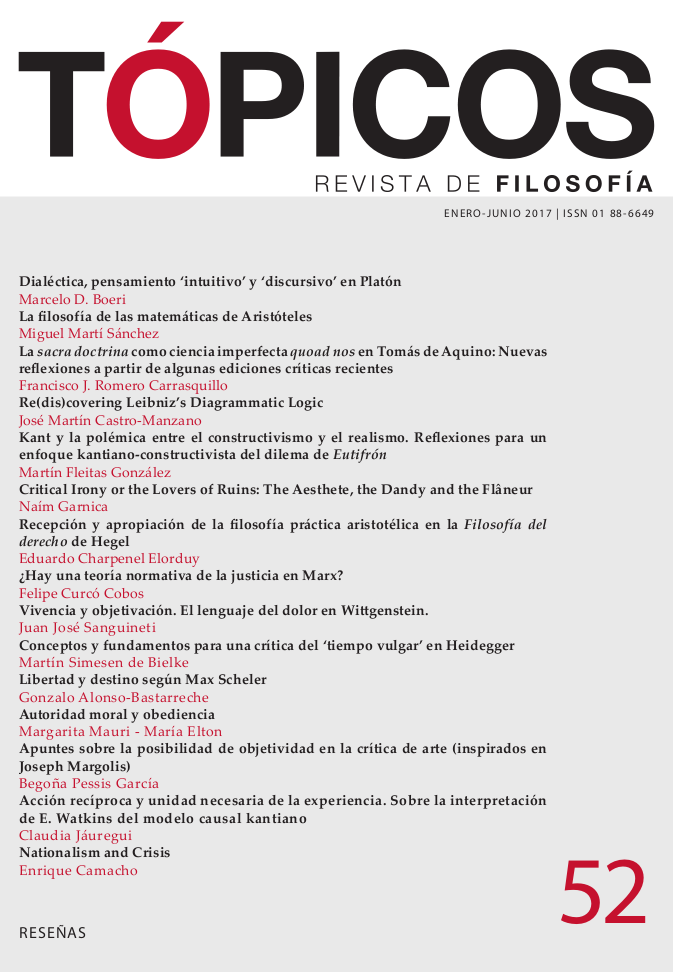Publicado 2016-12-27
Palabras clave
- Aristóteles,
- Hegel,
- filosofía del derecho,
- ética normativa,
- metodología ética
- teoría de la motivación ética,
- virtud y deber,
- historia del desarrollo del aristotelismo ...Más
Cómo citar
Resumen
En el presente artículo se examina la relación de la Filosofía del derecho de Hegel con la filosofía práctica aristotélica. Con ello se pretende mostrar, por una parte, que algunas de las tesis y motivos centrales de la filosofía del derecho hegeliana se entienden de mejor forma trayendo a primer plano ciertos planteamientos aristotélicos y, por otro lado, que dichos planteamientos son objeto de una reinterpretación y reelaboración por parte de Hegel ante ciertas exigencias históricas y losó cas del contexto moderno. En particular, se examina la relación entre estos dos autores atendiendo a dos puntos concretos: la metodología holística de una losofía práctica –entendida de modo amplio– y la teoría de la motivación ética.
Referencias
- Aristóteles. (1998). Ética nicomaquea. Ética eudemia. Madrid: Gredos.
- ____(1988). Política. Madrid: Gredos.
- ____(1957). Metaphysica. Oxford: Oxford Clarendon Press.
- ____(1957). Politica. Oxford: Oxford Clarendon Press.
- ____(1950). Physica. Oxford: Oxford Clarendon Press.
- ____(1894). Ethica nicomachea. Oxford: Oxford Clarendon Press.
- ____(1883). Magna moralia. Leipzig: Teubner.
- Baum, F. (2014). Wissenschaft als Selbs weck. Eine wissenschaftsphilosophische Untersuchung zu Aristoteles’ und Hegels Ideal der selbstgenügsamen Erkenntnis. Disertación doctoral. Dortmund.
- Berti, E. (1987). Contraddizione e dialettica negli antichi e nei moderni. Palermo: L’Epos.
- Cordua, C. (1989). El mundo ético. Ensayo sobre la esfera del hombre en la filosofía de Hegel. Barcelona: Anthropos.
- Dangel, T. (2013). Hegel und die Geistmetaphysik des Aristoteles. Berlín: Walter de Gruyter.
- Ferrarin, A. (2004). Hegel and Aristotle. Cambridge: Cambridge University Press.
- Gadamer, H-G. (1987). Hegel und die antike Dialektik. En Gesammelte Werke III. Neuere Philosophie. Tubinga: J.C.B. Mohr.
- Goldstein, J. D. (2006). Hegel’s Idea of the Good Life. From Virtue to Freedom, Early Writings and Mature Political Philosophy. Dordrecht: Springer.
- Hegel, G.W.F. (2005). Principios de la filosofía del derecho. Barcelona: Edhasa.
- ____(2003). Fenomenología del espíritu. México: FCE.
- ____(1986). Grundlinien der Rechtsphilosophie [GPR], Werke VII. Fráncfort: Suhrkamp.
- ____(1986). Phänomenologie des Geistes [PhG]. Werke III. Fráncfort: Suhrkamp.
- ____(1986). Enzyklopädie der philosophischen Wissenschaften III [EPW]. Werke X. Fráncfort: Suhrkamp.
- ____(1986). Vorlesungen über die Philosophie der Geschichte [VPG]. Werke XII. Fráncfort: Suhrkamp.
- ____(1986). “Über die wissenschaftlichen Behandlungsarten des Naturrechts”. En Jenaer Schriften [ÜwBN]. Werke II. Fráncfort: Suhrkamp.
- Horn, C. (2010). Antike Lebenskunst. Glück und Moral von Sokrates bis zu den Neuplatonikern. Múnich: C.H. Beck.
- Kamtekar, R. (2004). The Relationship between Aristotle’s Ethical and Political Discourses (NE X 9). En The Cambridge Companion to Aristotle’s Nicomachean Ethics. Cambridge: Cambridge University Press.
- López Farjeat, L. X. (2003) Hegel y Aristóteles: Una lectura de Metafísica XII, 7, 107b. Tópicos, 25, 18-30.
- Marx, K. (1971). Einleitung [zur Kritik der politischen Ökonomie]. En Werke. XIII (7). Berlín oriental: Dietz Verlag.
- Quante, M. (2011). Die Wirklichkeit des Geistes. Studien zu Hegel. Fráncfort: Suhrkamp.
- Pinkard, T. (1986). Freedom and Social Categories in Hegel’s Ethics. En Philosophy and Phenomenological Research, 47, 2.
- Pippin, R. (2008). Hegel’s Practical Philosophy. Rational Agency as Ethical Life. Cambridge: Cambridge University Press.
- McDowell, J. (1994). Mind and World. Cambridge Massachusetts: Harvard University Press.
- Pelczynski, Z. A. (1994). Political community and individual freedom in
- Hegel’s Philosophy of State. En The State & Civil Society. Studies in Hegel Political Philosophy. Cambridge: Cambridge University Press.
- Rawls, J. (2000). Lectures on the History of Moral Philosophy. Cambridge Massachusetts: Harvard University Press.
- Ritter, J. (1969). Auseinandersetzung mit der kantischen Ethik. En Metaphysik und Politik. Studien zu Aristoteles und Hegel. Fráncfort: Suhrkamp.
- Schopenhauer, A. (2002). Die Welt als Wille und Vorstellung. Múnich: Deutscher Taschenbuch Verlag.
- Schütrumpf, E. (2006). Erziehung durch den Staat. Beschränkung und Befreiung der Individualität in Aristoteles. En Wissen und Bildung in der antiken Philosophie. Stuttgart: J.B. Metzler.
- Stewart, J. (1996). Hegel’s Myths and Legends. Evanston: Northwestern University Press.
- Vigo, A. (1996). Zeit und Praxis in Aristoteles. Freiburg: Karl Alber Verlag.
- Weiss, F. G. (1969). Hegel’s Critique of Aristotle’s Philosophy of Mind. La Haya: Martinus Nijhoff.
- Westphal, K. (1993). The basic context and structure of Hegel’s Philosophy of Right. En The Cambridge Companion to Hegel. Cambridge: Cambridge University Press.
- Wood, A. W. (1993). Hegel’s ethics. En The Cambridge Companion to Hegel. Cambridge: Cambridge University Press.
- ____(1990). Hegel’s Ethical Thought. Cambridge: Cambridge University Press.






